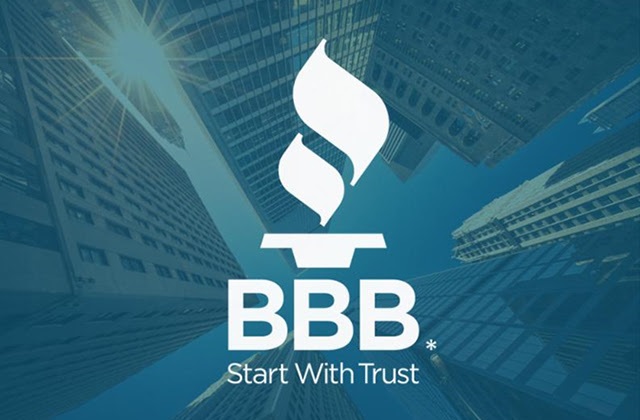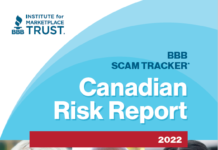JUNE 15 marks World Elder Abuse Awareness Day (#WEAAD). To help people raise awareness and prevent elder abuse, the Better Business Bureau (BBB) urges the public to recognize the signs of financial abuse and report any suspected mistreatment immediately.
According to Canadian research findings listed on the Government of Canada website, it is estimated that around 10 percent of older adults in Canada experience some form of abuse and that only one in five incidents of abuse is reported. Financial abuse/exploitation is one of the leading forms of elder abuse.
The BBB is regularly contacted about scams targeting seniors. According to the 2021 BBB Scam Tracker Risk Report, people ages 55-64 had the second highest median dollar loss among all age groups last year. Canadians ages 65+ lost money more in 2021 at 40.8% vs 35% in 2020.
To help safeguard the seniors in our lives, the BBB urges everyone to watch out for signs of financial abuse, be aware of common scams targeting seniors and report crimes to the right place.
Below is a combined list of common warning signs of financial abuse/exploitation, from the BC Securities Commission and the BBB:
- Unusual financial transactions, such as bank withdrawals or the liquidation of investments.
- Giving excessive financial reimbursement/gifts for care and companionship
- Sudden change in living arrangements.
- Unexplained disappearances of their valuable possessions, such as jewelry.
- Lack of amenities that the victim could afford or a discrepancy between the standard of living and financial assets.
- Sudden inability to pay bills or can’t afford things they need, like clothes, groceries, or medications.
- Financial responsibility for a family member.
- Unusual fear of or sudden change in feelings about a particular person or people.
- Caregiver controls elder’s money but fails to provide for elder’s needs
- A caregiver is overly concerned or overprotective about the elder spending money
- Elder/adult signs property transfers (Power of Attorney, new will, etc.) but is unable to comprehend the transaction or what it means
Tips for helping your loved one avoid fraud
- Become familiar with common scams targeting older adults. Knowing the most common tactics used to target older adults can help you easily identify when scams occur. According to the 2021 BBB Scam Tracker Risk Report, the top three scams affecting those 65+ are Online Purchase Scams, Travel/Timeshare Scams and Tech Support Scams. Another common scam is the Grandparents Scam, where a scammer contacts a grandparent claiming to be their grandchild who is in a dire situation and needs money immediately. All these scams prey on a senior’s generosity, fear or lack of tech savvy.
- Advise them not to make quick purchase decisions if they encounter ads on social media. Resist the urge to act immediately so you can do your research. Check business profiles on bbb.org for business ratings and customer reviews. Don’t rely solely on an online search. Instead, ask for help or advice from a trusted family member or friend. Remember, if a deal looks too good to be true, it probably is.
- Emphasize the criminal nature of telemarketing and email fraud. Learn how to identify it and understand that these tactics are illegal. In participating, it is possible they could be pulled into criminal activity unknowingly.
- Encourage the person to ignore phone calls and messages that appear suspicious. Don’t reply to, or click links within, emails or text messages that they are not familiar with.
- Have a calm discussion about securing accounts and monitoring finances. Helping older adults monitor their finances can be a great way to prevent scam activity and identify it if it has occurred.
- Ask them to get help if someone pressures them to invest or asks to access their investment or bank accounts. Encourage elders to talk about investment or other financial matters with people or professionals they trust. Or appoint a Trusted Contact Person for their investment account.
- Help the person change his or her phone number. If constant calls continue, it may be worth changing the person’s phone number. Registering the number with the Do Not Call list is a great first step, although scammers won’t necessarily follow the Do-Not-Call list laws. If unsafe calls continue, it may be best to change the phone number.
- Advise them to never give control of their computer to or share passwords with anyone who contacts them. Do not click on any links or call a number that pops up on your screen warning of a computer problem. If they see a pop-up alert on your computer screen, shut down your computer and restart it rather than call the phone number on the alert.
Report suspected fraud to:
- Report any scam to Better Business Bureau through BBB.org/scamtracker.
- Report fraud and cyber crime to the Candian Anti-Fraud Centre.
- Report investment fraud to the BC Securities Commission through their online complaint form.
- Talk to someone if you feel you or someone you love is being taken advantage of by contacting the BC Centre for Elder Advocacy & Support Seniors Abuse & Information Line (SAIL)at (604) 437-1940 or toll-free at 1 (866) 437-1940.












